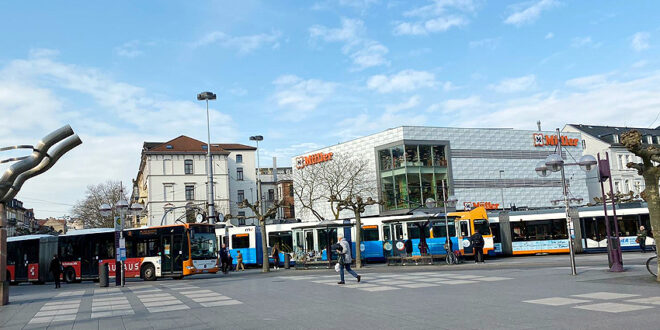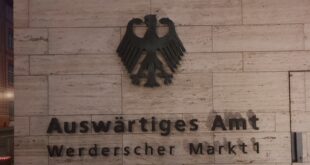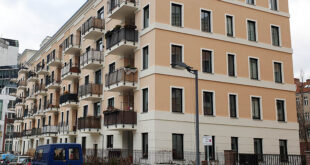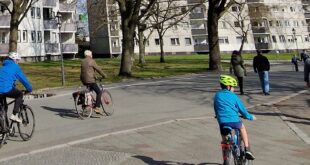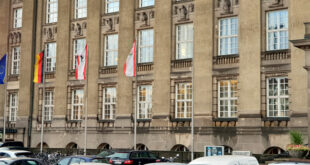The federal and state governments have adopted several drastic measures to slow down the increasing infection rate of coronavirus (Covid-19) in the country. The measures order unprecedented restrictions on public life in the country.
In a national TV address on Monday evening, Chancellor Angela Merkel said the federal government and the governments of the 16 federal states have agreed to close down non-essential businesses and public facilities throughout the country in the latest efforts to contain the highly contagious disease.
“There have never been measures like this in our country before,” Merkel announced. “They are far-reaching, but at the moment they are necessary.”
However, businesses such as supermarkets, pharmacies, petrol filling stations, public health facilities and other stores that serve the daily needs of the people are exempted from the measures.
Here are the most important measures that the federal government and the federal states have agreed to adopt to further decisively curb the spread of the Covid-19:
NOT CLOSED
Retail outlets for groceries, weekly markets, pick-up and delivery services, beverage stores, pharmacies, medical supply stores, drug stores, gas stations, banks and savings banks, post offices, hairdressers, dry cleaners, laundromats, newspaper sales, construction, horticultural and pet supplies markets are expressly NOT closed. Moreover, Sunday sales bans should generally be suspended for these areas until further notice. The opening of these facilities is subject to requirements of hygiene, control of access and the avoidance of queues. Service providers and craftspeople can continue to work. All healthcare facilities remain open, taking into account the increased hygienic requirements.
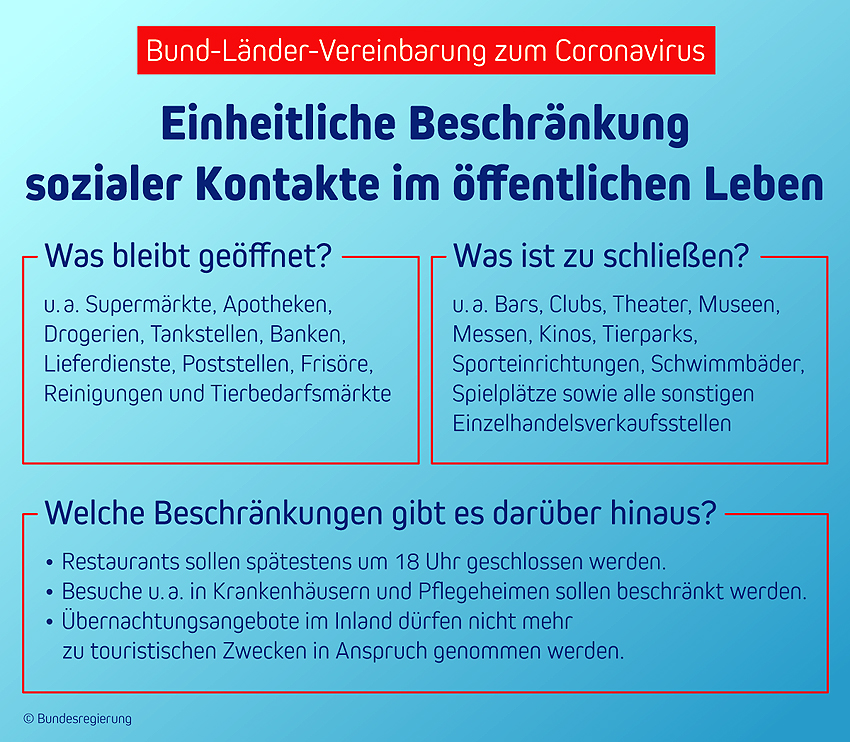
CLOSED
To be closed to the public
– Bars, clubs, discotheques, pubs and similar establishments
– Theatres, operas, concert halls, museums and similar institutions
– Trade fairs, exhibitions, cinemas, amusement and animal parks and providers of leisure activities (indoors and outdoors), special markets, amusement arcades, casinos, betting shops and similar facilities
– Prostitution centres, brothels and similar establishments
– The sports business on and in all public and private sports facilities, swimming pools and fun pools, gyms and similar facilities
– All other retail outlets not mentioned elsewhere in this document, in particular outlet centres
– Playgrounds.
PROHIBITED
To be prohibited
– Get-togethers in clubs and other sports and leisure facilities as well as adult education centres, music schools and other public and private educational institutions outside of school as well as travel by coach
– Meetings in churches, mosques, synagogues and the gatherings of other faith communities.
ORDERS TO BE ISSUED
– Visitation regulations for hospitals, preventive and rehabilitation facilities, nursing homes and similar facilities to limit visits (e.g. visit once a day, for one hour, but not for children under 16 years, not for visitors with respiratory infections, etc.)
– in the above-mentioned institutions as well as in universities, schools and kindergartens, unless their operation has been completely stopped, a general entry ban for persons who have been in risk areas abroad or particularly affected regions in Germany in the last 14 days
– Requirements for cafeterias, restaurants, restaurants and hotels to minimise the risk of spreading the Corona virus, for example by regulating the distance between tables, regulating the number of visitors, hygiene measures and instructions
– Regulations that accommodation offers in Germany can only be used for necessary and expressly not for tourist purposes,
– Regulations that restaurants and dining establishments are generally to be opened no earlier than 6 a.m. and closed no later than 6 p.m.
“Reduce your social life as much as possible,” a representative of the Germany’s disease control agency, the Robert Koch Institute, urged on Monday.
It is hoped that these measures may contain the spread of COVID-19, especially to those in the high-risk group.
© The African Courier
———-
For the latest information from the Federal Government of Germany on its management of the corona crisis, click here
 THE AFRICAN COURIER. Reporting Africa and its Diaspora! The African Courier is an international magazine published in Germany to report on Africa and the Diaspora African experience. The first issue of the bimonthly magazine appeared on the newsstands on 15 February 1998. The African Courier is a communication forum for European-African political, economic and cultural exchanges, and a voice for Africa in Europe.
THE AFRICAN COURIER. Reporting Africa and its Diaspora! The African Courier is an international magazine published in Germany to report on Africa and the Diaspora African experience. The first issue of the bimonthly magazine appeared on the newsstands on 15 February 1998. The African Courier is a communication forum for European-African political, economic and cultural exchanges, and a voice for Africa in Europe.

